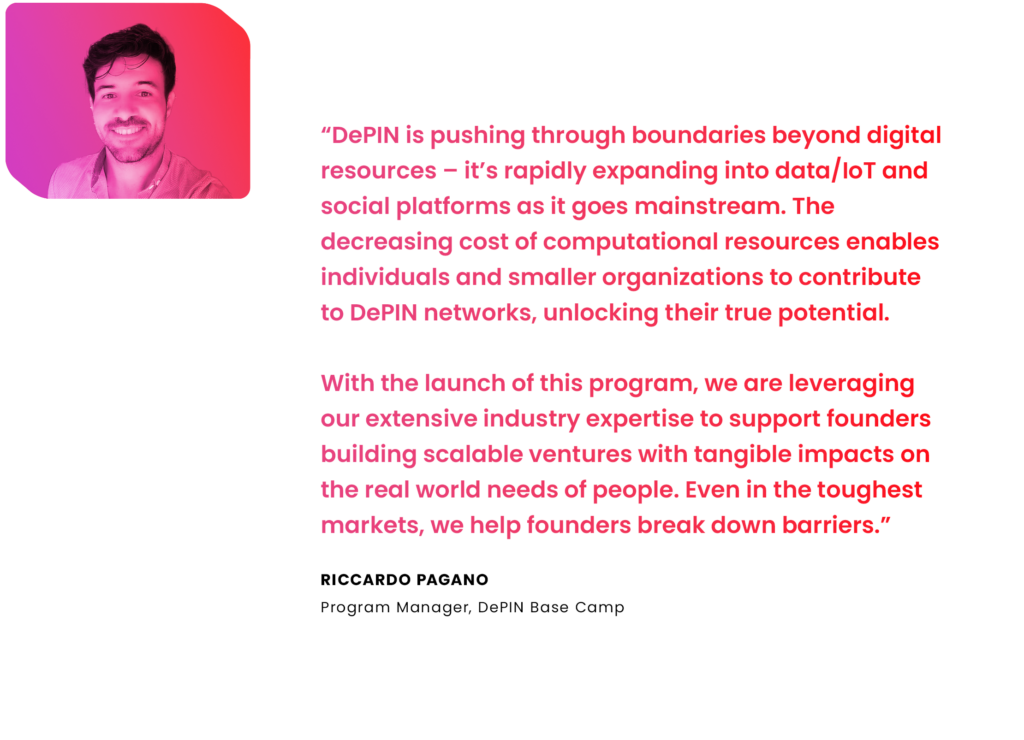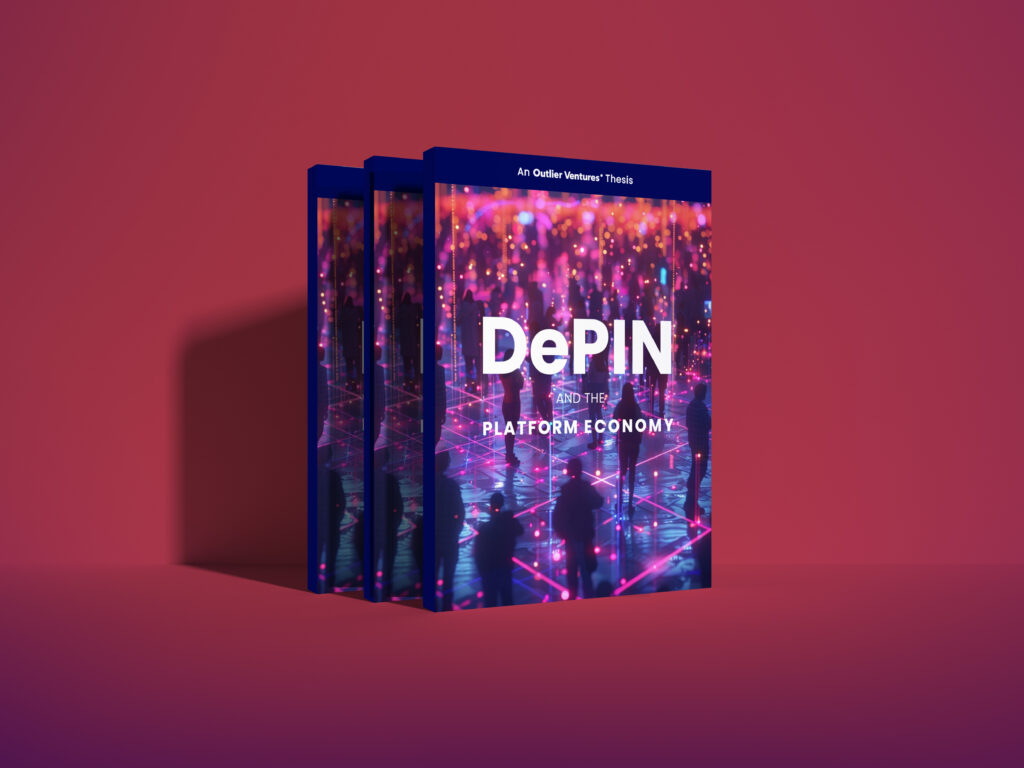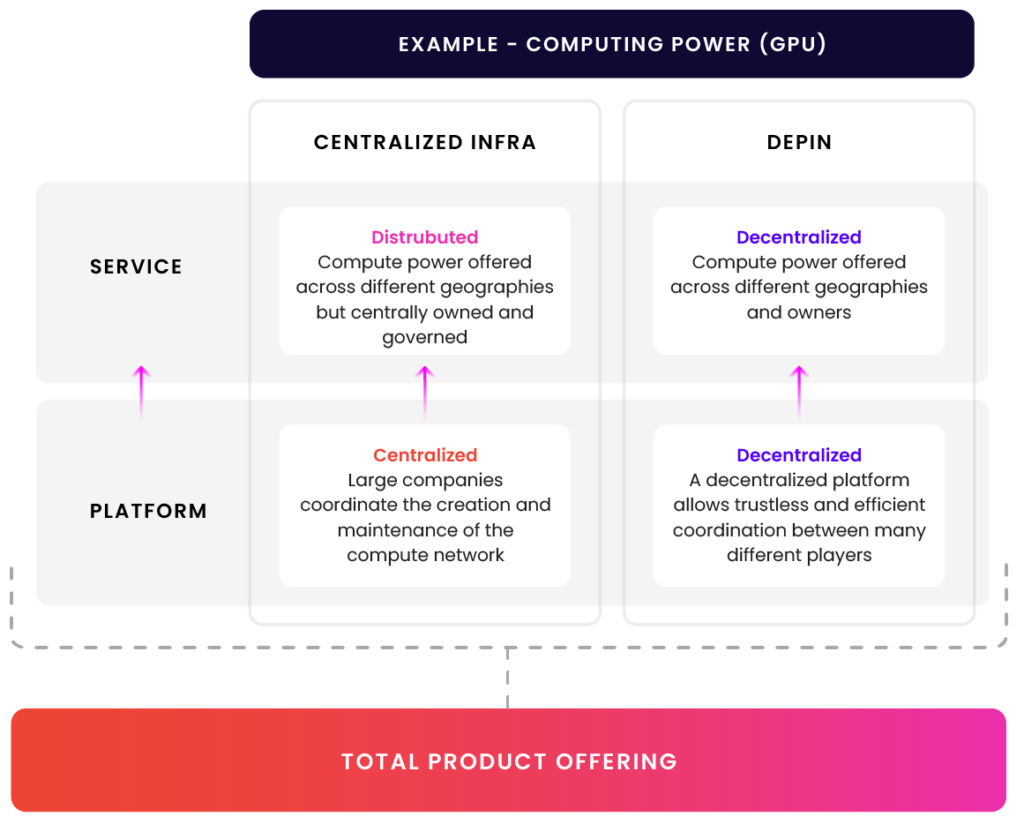- The DePIN Base Camp is a Web3 accelerator program run by Outlier Ventures in collaboration with peaq, with a focus on supporting early-stage Web3 founders building on all blockchains.
- The DePIN Base Camp will support early-stage startups looking to build applications, products, protocols that utilise digital networks, decentralized infrastructures and data services.
- The 12-week virtual accelerator program will include workshops with subject matter experts from Outlier Ventures and peaq’s group of core contributors, as well as mentorship from industry experts and up to $200,000 USD investment for participating teams.
- Applications are now open and will close in April, 2024 with the program starting in May, 2024.

Introducing the DePIN Base Camp
We are excited to announce the launch of the DePIN Base Camp accelerator program in collaboration with peaq, the layer-1 blockchain for real-world applications. The program will begin in May 2024 and last for 12 weeks, with teams receiving up to $200,000 USD investment. The new program will focus on supporting the best founders from around the world, with selected teams engaging in a variety of virtual workshops, mentoring sessions and more, culminating in a virtual Demo Day.
Decentralized physical infrastructure networks (DePINs) leverage tokens to crowdsource real-world infrastructure such as smart sensors or Web access points. Starting to go mainstream, DePIN projects are pushing through boundaries beyond digital resources and rapidly expanding into other areas such as Telecom, Technology and more, all currently dominated by centralised companies. This momentum and the promise of a tectonic shift presents an opportune moment further outlined in Outlier Ventures’ thesis here.
“DePIN is breaking new ground, extending its reach from digital resources into data/ IoT and social platforms as it becomes more widely adopted.” Said Benjamin Meyer, Chief Product Officer, Outlier Ventures. “We are really excited to be collaborating with peaq to launch the DePIN Base Camp Accelerator program, bringing our collective expertise to support founders building scalable ventures and addressing real-world needs.”
The DePIN Base Camp will bring together a group of Web3 startups who are focused on unlocking the full potential of DePINs. The accelerator’s goal is to arm promising DePIN projects with all the know-how and support they need to provide a Web3 alternative to the incumbents in real-world industries, from data collection to distributed computation, connectivity, and more. While the program is open to founders building across all blockchains, participating startups will also have the opportunity to leverage peaq’s DePIN-focused layer-1 blockchain, its Modular DePIN Functions and its sister network krest.
Throughout the duration of the program, Outlier Ventures and peaq’s team of in-house experts will provide bespoke support customised to each startup’s needs, supporting teams across segments including, but not limited to data networks, decentralized digital infrastructure networks, data/(Internet of Things (IoT) and service networks and Infrastructure and tooling, AI-enabled UX and decentralized AI models. The founding team behind peaq, who have been working on what is now known as DePINs since 2017, will also provide its expertise in various aspects of building and running a DePIN, from architecture to core business model and incentive mechanism.
“DePIN is the most exciting Web3 sector. It’s what everyone’s been waiting for — real-world use. Blockchain-based applications that anyone can use and want to use,” Max Thake, co-founder of peaq. “It’s promising to see well-respected, forward-thinking Web3 investors in Outlier Ventures recognize its potential so early on. We’re thrilled to be collaborating on this, helping launch projects that will have a big, tangible, positive real-world impact not long from now. peaq was purpose-built to power DePINs, so we’re looking forward to providing the best possible network for the next generation of visionary DePIN founders.”
The teams will also receive support from subject matter experts on core aspects such as their product roadmap, community building, entity structuring, and beyond. The teams will also have direct access and support from a network of leading mentors from within the Web3 industry, along with investors, to aid in their future fundraising focus. Finishing the program, founders will participate in a virtual Demo Day aimed at enhancing their visibility within the wider Web3 investor community.
Applications are now open until April, 2024. The 12-week program will commence in May 2024.
About peaq
peaq is the blockchain for real-world applications. The peaq layer-1 blockchain enables anyone to build Decentralized Physical Infrastructure Networks (DePINs) for car-sharing, street-mapping, noise pollution tracking, internet access, and more. On peaq, robots, vehicles, and other connected devices turn into real-world assets (RWAs), independent economic actors providing goods and services in the Economy of Things.
peaq works with industry-leading consortia such as Gaia-x moveID, a €20+ million project led by Bosch, to co-create the future of smart mobility, energy, connectivity, and other important real-world industries. By empowering everyone to own, govern, and earn from the devices and infrastructure they use, peaq is democratizing abundance in the age of AI-driven automation.For more information, visit peaq, follow peaq on Twitter for updates, and join the conversation on Discord.
Introducing our DePIN thesis
DePIN has seen early success with digital infrastructure like storage and connectivity. We believe the next wave will revolve around DePIN being used for data extraction and social networks.
DePIN will be a big narrative in the upcoming bull market and is set to become the key driver behind mainstream adoption of web3 technology. Distributed ledgers, smart contracts and utility tokens are building blocks that allow for a decentralized yet coordinated approach to provide critical infrastructure.
Read our latest thesis to learn more about how we see this space evolving.

Executive Summary
DePIN has seen early success with digital infrastructure including storage and connectivity. We believe that through the decentralized coordination of physical infrastructure and resources more business models are about to be disrupted. The next wave of DePIN will revolve around data and services that are increasingly built on special purpose blockchains and tailored SDKs.
This study aims to provide founders and investors with a comprehensive understanding of DePIN, an area we anticipate will have a significant impact across multiple sectors.
Unlocking the Decentralized Platform
Business models that operate physical infrastructure are made up of two parts. First is “the platform”, the infrastructure layer that coordinates the economic activity between the physical resources or nodes. Second is “the service”, referring to the economic service or product as a result of coordinating these resources in a specific way. Traditionally, the platform on which these businesses are built have been centrally organised due to the complexity of creating and maintaining these platforms. Blockchain technology changes this. Through technological innovation, the platform can become decentralized by leveraging the trustlessness and automated execution of the blockchain. Replacing the centrally coordinated platforms with a decentralized alternative eliminates costs and creates a more direct route from resource to users. All of this leads to the optimization of existing services and an entirely new category of services becoming economically viable, previously impossible due to high costs and inefficiencies related to centralized platform coordination. This breakthrough forms the basis for Web3 and when dealing with physical resources is called decentralized physical infrastructure (DePIN).

The New Frontier
The applications built using DePIN are expanding outside of the scope of traditional physical infrastructure into verticals like data collection, AI infrastructure and the platform economy. We see two drivers behind this.
- The purpose of physical infrastructure is changing – Move to Data Networks DePIN is transforming the purpose of physical infrastructure beyond traditional roles, shifting from digital services to data extraction. By creating a network of decentralized nodes, hosts can provide a way to extract valuable data. In doing so, DePIN is redefining infrastructure’s value proposition, merging connectivity with data generation.
- The definition of physical infrastructure is changing – Move to Service Networks The definition of (critical) physical infrastructure is extending beyond traditional physical constructs. Over past decade, society has increased its economic dependence on service networks (socials ie. Facebook etc, Services, ie. Uber etc.,…). These networks historically relied on centralized entities coordinating social economical activities. DePIN is moving from digital infrastructure into service networks.
Why now?
Beside the obvious technical improvement in blockchain-based systems, we believe there are five key drivers, pushing DePIN adoption forward on both the demand and the supply side.
- Cost curves – Cost curves of compute and hardware have come down drastically, making small scale node operation economically viable.
- Usability – AI-enabled front-ends are falling into the hands of consumers, improving decision making and management of DePINs and tokens.
- Privacy & Security – Since the diffusion Gen AI across billions of users globally, the concerns with privacy and security of data and services has drastically increased, leading to more user exploration for alternative
solutions. - Data Generation – There is an increase in data generation across network nodes propelled by the movements of AI and opensource.
- Utility tokens – tokenomics create the backbone of the incentive structure behind DePIN. After a few cycles, we believe that the expertise to create utility tokens structures is mature enough for many DePINs to successfully be bootstrapped.




